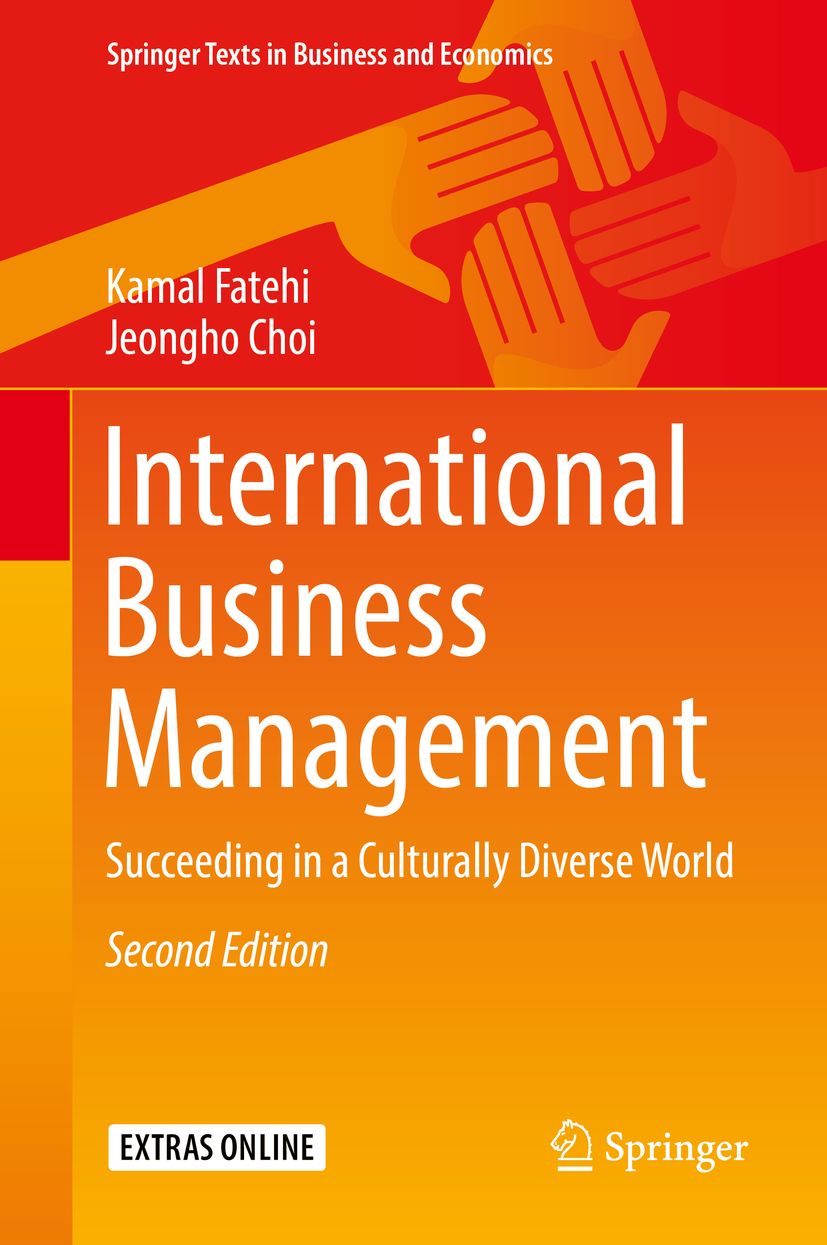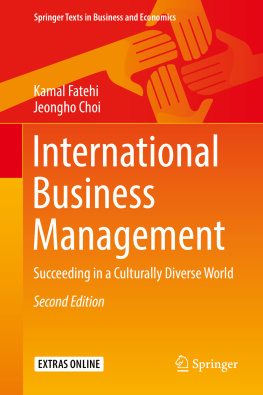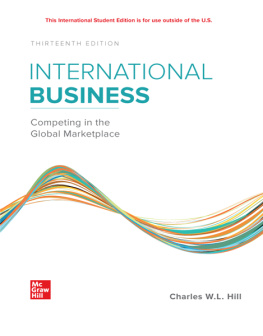Kamal Fatehi - International Business Management
Here you can read online Kamal Fatehi - International Business Management full text of the book (entire story) in english for free. Download pdf and epub, get meaning, cover and reviews about this ebook. year: 0, publisher: Springer International Publishing, genre: Business. Description of the work, (preface) as well as reviews are available. Best literature library LitArk.com created for fans of good reading and offers a wide selection of genres:
Romance novel
Science fiction
Adventure
Detective
Science
History
Home and family
Prose
Art
Politics
Computer
Non-fiction
Religion
Business
Children
Humor
Choose a favorite category and find really read worthwhile books. Enjoy immersion in the world of imagination, feel the emotions of the characters or learn something new for yourself, make an fascinating discovery.
- Book:International Business Management
- Author:
- Publisher:Springer International Publishing
- Genre:
- Year:0
- Rating:3 / 5
- Favourites:Add to favourites
- Your mark:
- 60
- 1
- 2
- 3
- 4
- 5
International Business Management: summary, description and annotation
We offer to read an annotation, description, summary or preface (depends on what the author of the book "International Business Management" wrote himself). If you haven't found the necessary information about the book — write in the comments, we will try to find it.
International Business Management — read online for free the complete book (whole text) full work
Below is the text of the book, divided by pages. System saving the place of the last page read, allows you to conveniently read the book "International Business Management" online for free, without having to search again every time where you left off. Put a bookmark, and you can go to the page where you finished reading at any time.
Font size:
Interval:
Bookmark:

More information about this series at http://www.springer.com/series/10099

This Springer imprint is published by the registered company Springer Nature Switzerland AG
The registered company address is: Gewerbestrasse 11, 6330 Cham, Switzerland
Kamal Fatehi
This book is dedicated to my family
Jeongho Choi
This book is dedicated to my family:
My lovely wife, Julie-Kunyoung, and my sons, Philip and Leonard
We are living in a world where the only certainty is the uncertainty in the human affairs. A few decades ago, it was common among the academicians to discuss a future where large multinational corporations would be in charge and the national governments would exist in name only without meaningful powers. There were predictions that the world would become a global village in which the people would face a new reality very much akin to living in a village. The villagers collectively would be aware of each other. Their lives would be subject to scrutiny by others and be impacted by them. Now, not only we have arrived at such a village, we are transforming this village beyond recognition, and a wrong move by any government in name only could doom us all. Even without such a catastrophe, our lifestyle and our industrial activities are so myopic and contrary to maintaining a healthy and sustainable life that continuing it would not be much different than a grave mistake by a national government that could have a disastrous consequence. We are locked in a zero-sum game in which the selfish attempt for the individual gain at the expense of our neighbors is becoming a norm and not an exception. Some are engaged in an international trade where they sacrifice long-term results and bargain for short-term benefits. Lets hope that these issues are just aberrations.
Globalization is well underway. There is no exaggeration if we claim that we have arrived at the global village. The arrival is not celebrated by the villagers, and there is not a welcome mat. Instead, the arrival is marked with a note of caution and a reminder.
The caution note warns us that there are unanticipated outcomes to globalization such as heightened security concerns due to rising acts of violence and terror instigated by, among other things, the stark awareness of value differences. These value differences are brought forth by globalization forces that threaten the possibility of preserving separate ethnic identities and the prospects of assimilation of all by the forces of modernity. The isolation of cultures, nations, and markets of the previous period has been replaced by close interaction, intermingling, and integration among them, actually or virtually. International business and international management have significant roles in all this. To move cautiously in the uncharted waters of global business and to mitigate unanticipated consequences of globalization necessitate the study of international management.
The reminder is to shake us up from the comfortable complacency that is an attribute of success. The past technological progress in product developments and processes has lulled firms from industrialized nations into the false assumption that past success can continue unabated into the future. This is far from the true reality. The challenge to this comfortable position comes from business corporations from the emerging markets of Asia, the Middle East, and Latin America. Business enterprises from emerging markets that are going global pose formidable challenges to existing rivals from industrialized countries. In these markets, which are home to the majority of the world population, the emerging global firms have an advantage of being insiders. These are the future firms in the future markets. These markets are growing at much faster rates than their counterparts in developed countries. Supplying these markets successfully requires understanding their uniqueness, which is due to systemic and cultural differences. It is international management that can teach us about the complexity and intricacy of these markets and their people that often are as exotic as they are mysterious to the uninitiated.
Globalization and vanishing national borders have influenced almost everything that we do, particularly in business organizations. Although conflicts between nations have not disappeared, commonality of interest among them in creating a better life for their people is amply evident. This commonality of interest, in part, is manifested through international business. While national governments are obligated to take a nationalistic posture, multinational companies (MNCs) are slowly but inexorably forced to transcend national boundaries. They have the difficult task of integrating the varied values of their diverse workforce in establishing a vision and setting goals for the whole corporation. They have to manage people whose values and expectations are dissimilar. The responsibility of managing across national borders and competing in a culturally diverse world can be satisfied if these managers assume a multicultural perspective. This book offers such a perspective.
The world economy, particularly with the advent of the Internet, is moving ever faster toward a highly interrelated, interdependent state, in which no nation will be immune from the forces of the global market. Increased interdependency, however, does not mean market uniformity or universality of management practices. Cultural, political, and, to some extent, economic diversity differentiates nations and creates unique market segments. Managing a business, be it domestic or international, in such a milieu requires understanding of these diversities.
Font size:
Interval:
Bookmark:
Similar books «International Business Management»
Look at similar books to International Business Management. We have selected literature similar in name and meaning in the hope of providing readers with more options to find new, interesting, not yet read works.
Discussion, reviews of the book International Business Management and just readers' own opinions. Leave your comments, write what you think about the work, its meaning or the main characters. Specify what exactly you liked and what you didn't like, and why you think so.









